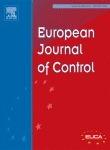Journal
Please choose volume & issue:
-
Bounded backstepping control and robustness analysis for time-varying systems under converging-input-converging-state conditions
Abstracts:We provide new bounded backstepping results that ensure global asymptotic stability for a large class of partially linear systems with an arbitrarily large number of integrators. We use a dynamic extension that contains one artificial delay, and a converging-input-converging-state assumption. When the nonlinear subsystem is control affine, we provide sufficient conditions for our converging-input-converging-state assumption to hold. We also show input-to-state stability with respect to a large class of model uncertainties, and robustness to delays in the measurements of the state of the nonlinear subsystem. We illustrate our result in a first example that has a nondifferentiable vector field and so is beyond the scope of classical backstepping, and then in a nonlinear example that illustrates how one can combine Lyapunov and trajectory based methods to check our assumptions.
-
Almost-global tracking for a rigid body with internal rotors
Abstracts:Inspired by recent work on a PID-like tracking control law for an interconnected mechanical system on a Lie group, this article presents a novel tracking control law for such mechanical systems, adapted from the one proposed by the authors for systems evolving on a Riemannian manifold setting. The interconnected mechanical system consists of a rigid body with three internal rotors for attitude actuation. The novelty of the control law lies in viewing the rigid body as a simple mechanical system (SMS) by incorporating the additional quadratic velocity terms arising from the interconnection into the control law, and then proceeding with a straightforward stabilizing PID tracking synthesis. The novel algorithm achieves tracking of feasible trajectories from almost all initial conditions.
-
Singular optimal control by minimizer flows
Abstracts:This paper studies a computational method to deal with a singular optimal control problem by minimizer flows in a viscosity approximation to the Hamilton–Jacobi–Bellman equation. The boundary of the compact constraint set of control variable is intersected with a class of minimizer flows to yield a Hamiltonian extremal function in rewriting the HJB equation. The analysis properties of the flow are revealed in a global optimization framework. An example on computing a minimizer flow and a Hamiltonian extremal function is presented. An application of the minimizer flow in a non-smooth optimization problem is also mentioned.
-
A relaxation approach to optimal control of Volterra integral equations
Abstracts:We consider an optimal control problem for systems defined by nonlinear Volterra integral equations, with state constraints. No convexity assumptions are made on the data, and the problem is transformed into its relaxed form. We prove the existence of an optimal relaxed control and derive necessary conditions for optimality in the form of a relaxed minimum principle of Pontryagin type. We then apply a mixed Frank-Wolfe penalty method which constructs sequences of relaxed controls converging to extremal controls for this problem. A numerical example is given.
-
Adaptive control of a 7-DOF exoskeleton robot with uncertainties on kinematics and dynamics
Abstracts:In this paper, we propose a new adaptive visual tracking control approach based on sliding mode control in Cartesian space applied to an exoskeleton robot with uncertain kinematics and dynamics, taking into account uncertainties in visual system (camera) parameters. The adaptation of kinematic uncertainties is based on a filtered regressor kinematic matrix, whereas, the adaptation of dynamic uncertainties is based on a Time Delay Estimation approach. This is performed considering the Time Delay Error (TDR) to provide a control action capable of following the designed functional therapy tasks. A new recursive controller is combined with TDE in order to estimate the TDR and limit its effect. The proposed strategy does not need the accurate dynamic and kinematic models of the exoskeleton. The update laws are designed using Lyapunov theory to solve the adaptation problem methodically and to show the stability of the robot system. Experimental results confirm the effectiveness and feasibility of the designed approach.
-
Optimal switching control for drug therapy process in cancer chemotherapy
Abstracts:In this paper, the drug therapy problem in cancer chemotherapy is formulated as an optimal control problem of switched systems. In this problem, the modes switch under state-dependent. This is different from the existing optimal control problem of switched systems, in which the modes switch under time-dependent. Thus, the existing optimal control approaches of switched systems with time-dependent switching can not directly used to solve this Problem, and a new numerical computation method is required to develop for solving such problem. Firstly, based on introducing a binary function, relaxing the binary functions and including a penalty term on the relaxation, we obtain an equivalent optimal control problem of constrained nonlinear system. By using the time-scaling transformation, the smoothing technique, and the idea of
l 1 penalty function method, the equivalent optimal control problem is transformed into a nonlinear parameter optimization problem. Then, a gradient-based continuous filled function algorithm is developed for solving the nonlinear parameter optimization problem. Finally, a numerical example is used to illustrate our method is low time-consuming, has faster convergence speed, and yields a better objective function value than the existing algorithms. -
Robust performance analysis of linear discrete-time systems in presence of colored noise
Abstracts:In this paper, linear discrete-time time-invariant (LDTI) normal and descriptor systems with norm-bounded parametric uncertainties are under consideration. The input signal is supposed to be a “colored” noise with bounded known mean anisotropy level (spectral color). The conditions of anisotropic norm boundedness for such class of systems are derived. The algorithm is based on convex optimization technique. A numerical example is given.
-
Attitude tracking with an adaptive sliding mode response to reaction wheel failure
Abstracts:This paper proposes an attitude tracking control for a rigid spacecraft that adapts to two types of faults that commonly occur in reaction wheels: a gain fault and a deviation fault. In its normal operating mode the tracking controller replicates that of a continuous quaternion feedback controller. When a fault occurs in the system the attitude of the spacecraft will deviate from the reference trajectory and will consequently trigger a sliding mode response of the control which introduces robustness. For the proposed control law, we construct a suitable Lyapunov function to prove the closed-loop system is asymptotically stable in the presence of such faults. However, the proposed control is not practically suitable over long periods as the gain on the sliding mode component will always increase unless the sliding surface is exactly zero (in practise this is never the case because of sensor noise). To address this problem a simple adaptive parameter is defined such that it converges to an appropriate upper-limit. Simulations of the attitude dynamics of a spacecraft are undertaken which compares the tracking performance in the presence of a fault with and without the adaptive sliding mode component.
-
Stabilization of linear impulsive systems under dwell-time constraints: Interval observer-based framework
Abstracts:The problem of interval observer design is studied for a class of linear impulsive systems. Ranged and minimum dwell-time constraints are considered under detectability assumption. The first contribution of this paper lies in designing interval observers for linear impulsive systems under ranged and minimum dwell-time constraints, and investigating positivity of the estimation error dynamics in addition to stability. Several observers are designed oriented on different conditions of positivity and stability for estimation error dynamics. The boundedness of the estimation error (input-to-state stability property) and the observer stability conditions are stated as infinite-dimensional linear programming problems. Next, an output stabilizing feedback design problem is discussed, where the stability is checked using linear matrix inequalities (LMIs). Efficiency of the proposed approach is demonstrated by computer simulations for a commercial electric vehicle equipped with a low power range extender fuel cell, a bouncing ball, an academic linear impulsive system and for Fault Detection and Isolation (FDI) and Fault-Tolerant Control (FTC) of a power split device with clutch for heavy-duty military vehicles.
Hot Journals
- Risk Breakdown Matrix for Risk-Based Inspection of Transportation Infrastructure Projects
- Social Control in Outsourced Architectural and Engineering Design Consulting Projects: Behavioral Consequences and Motivational Mechanism
- 2022 Best Paper Award
- Hold-Ups and Failures in Negotiated Order: Unearthing the Nuances of Rework Causation in Construction
- Prevalence and Risk Factors for Poor Mental Health and Suicidal Ideation in the Nigerian Construction Industry
- Impact of Wind Load Characteristics on Computed Bridge Stay-Cable Forces Used for Bridge Health Monitoring
- Weak-End and Frequency Detection of Elastically Supported Bridges by Contact Residual Response of Two-Axle Test Vehicle in a Round Trip
- Development of Performance-Based Fragility Curves of Coastal Bridges Subjected to Extreme Wave-Induced Loads
- An Analytical Model to Evaluate Short- and Long-Term Performances of Post-Tensioned Concrete Box-Girder Bridges Rehabilitated by an Ultrahigh-Performance Concrete Overlay
- Experimental and Numerical Studies on Dynamic Response of Parallel Wire Cables Subjected to Close-In Explosions
- Three-Dimensional Velocity Distribution in Straight Smooth Channels Modeled by Modified Log-Law
- Experimental Investigation on Flow Past Two and Three Side-by-Side Inclined Cylinders
- An Experimental Investigation of Rotor–Box Aerodynamic Interaction 1
- Modeling Gas–Liquid Flow Between Rotating and Nonrotating Annular Disks
- Entry Length Requirements for Two- and Three-Dimensional Laminar Couette–Poiseuille Flows
Acta Astronautica (1,768)
- Mixed-integer trajectory optimization with no-fly zone constraints for a hypersonic vehicle
- Adaptive control design for active Pogo suppression of large strap-on liquid launch vehicles
- Machine learning based approach for modeling and forecasting of GPS–TEC during diverse solar phase periods
- Effect of two-dimensional micro-cavity surface on hypersonic boundary layer
- Investigation on burning behaviors of aluminum agglomerates in solid rocket motor with detailed combustion model
Advanced Materials (3,745)
- Structured Perovskite Light Absorbers for Efficient and Stable Photovoltaics
- Strategies for High‐Performance Solid‐State Triplet–Triplet‐Annihilation‐Based Photon Upconversion
- Atomic Engineering Catalyzed MnO2 Electrolysis Kinetics for a Hybrid Aqueous Battery with High Power and Energy Density
- Crystal Adaptronics: Global Performance Indices for Dynamic Crystals as Organic Thermal Actuators (Adv. Mater. 20/2020)
- Enlightening Materials with Photoswitches








 User Center
User Center My Training Class
My Training Class Feedback
Feedback






